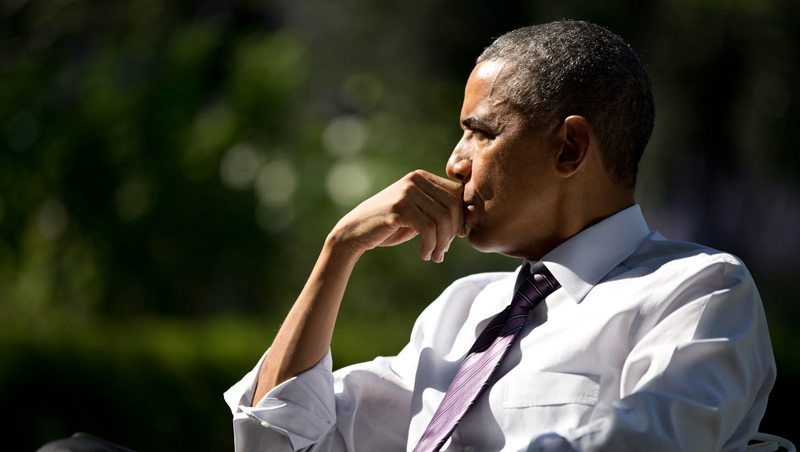
President Obama Wednesday commemorated the 150th anniversary of abolishing slavery in the U.S., using the occasion to draw parallels to the current political furor over Muslim immigration and terrorism.
“We betray the efforts of the past if we fail to push back against bigotry in all its forms,” Mr. Obama told congressional leaders and other dignitaries in a ceremony at the Capitol. “Our freedom is bound up with the freedom of others, regardless of what they look like or where they come from or what their last name is or what faith they practice.”
In marking the anniversary of the 13th Amendment, the president didn’t call out Republican foes such as Donald Trump or Sen. Ted Cruz of Texas, who have criticized his plan to accept refugees from Syria and Iraq. He said America must not “let cynicism consume us and fear overwhelm us.”
House Majority Leader Kevin McCarthy, California Republican, called the 13th Amendment “the most significant act in our history since our founding.”
“Hundreds of thousands died to allow this amendment to pass,” he said. “And in the years and generations that followed, more fought to ensure that African-Americans would be treated with the same respect and guaranteed the same rights as everyone in this country.”
Mr. Obama paid tribute to abolitionists Harriet Tubman and Frederick Douglass, President Lincoln and civil rights leader Martin Luther King Jr. for working for equality. But he said the impact of slavery can still be seen in the U.S. today.
“We would do a disservice to those warriors of justice — Tubman and Douglas and Lincoln and King — were we to deny that the scars of our nation’s original sin are still with us today,” Mr. Obama said. “We condemn ourselves to shackles once more if we fail to answer those who wonder if they’re truly equals in their communities, or in their justice systems, or in a job interview.”
The president said that even after slavery was abolished, and two more amendments were ratified to guarantee equal protection and voting rights, changes were slow to come for black citizens.
“For another century, we saw segregation and Jim Crow make a mockery of these amendments, and we saw justice turn a blind eye to mobs with nooses slung over trees,” Mr. Obama said. “We saw bullets and bombs terrorize generations. And yet, through all this, the call to freedom survived.”
The 13th Amendment to the Constitution declared that “Neither slavery nor involuntary servitude, except as a punishment for crime whereof the party shall have been duly convicted, shall exist within the United States, or any place subject to their jurisdiction.” Formally abolishing slavery in the U.S., it was passed by the Congress on Jan. 31, 1865, and ratified by the states on Dec. 6, 1865.
President Lincoln freed many slaves by issuing the Emancipation Proclamation in 1863, but the 13th Amendment permanently abolished slavery in all states after the Civil War had ended. Alabama, North Carolina and Georgia ratified the measure in the first week of December, 1865, providing the required three-quarters of states.
One northern state, New Jersey, ratified the 13th Amendment in 1866 after initially rejecting it in 1865. Three other states didn’t ratify it until the 20th century: Delaware in 1901, Kentucky in 1976, and Mississippi in 1995.
Mississippi’s action wasn’t certified officially until February 2013, when the state sent the required documentation to the National Archives.
The ratification of the 13th Amendment did not change life for many black people. Legislatures in southern states adopted so-called “black codes” or a system known as peonage that resulted in many blacks essentially ending up as forced laborers; those injustices persisted in some states until World War II.



Expositores: Oscar Vidarte (PUCP) Fernando González Vigil (Universidad del Pacífico) Inscripciones aquí. Leer más
Una retrospectiva para entender los próximos cuatro años. Leer más
En la conferencia se hará una presentación de los temas más relevantes del proceso de negociación se llevó a cabo desde el 2012, así como del acuerdo de paz firmado entre el Gobierno colombiano y la guerrilla de las FARC a finales del 2016. Se analizarán los desafíos y las... Leer más
El Observatorio de las Relaciones Peruano-Norteamericanas (ORPN) de la Universidad del Pacífico es un programa encargado de analizar y difundir información relevante sobre la situación política, económica y social de Estados Unidos y analizar, desde una perspectiva multidisciplinaria, su efecto en las relaciones bilaterales con el Perú.
© 2026 Universidad del Pacífico - Departamento Académico de Humanidades. Todos los derechos reservados.

